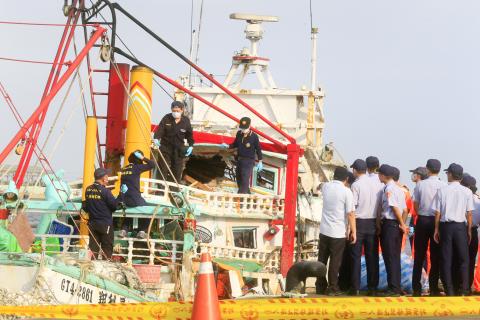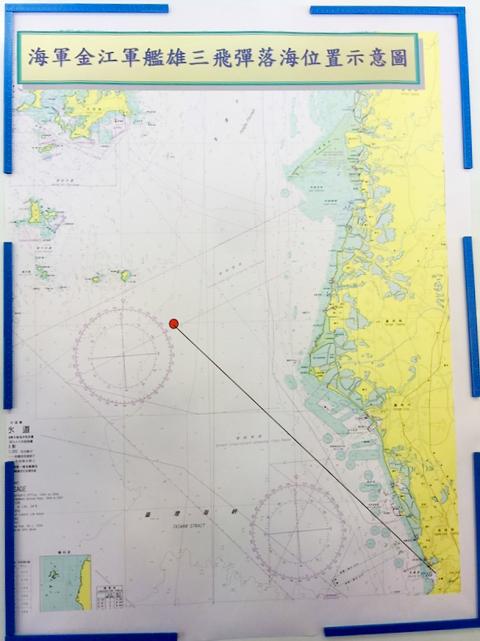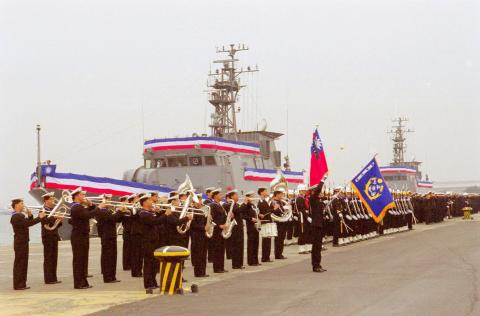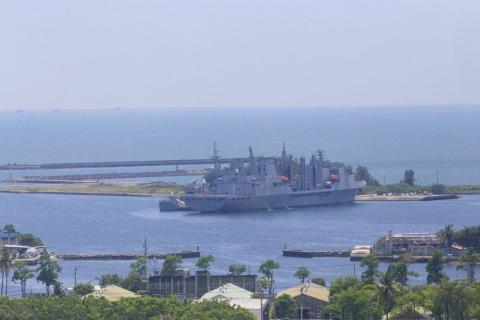One fisherman was killed and three injured after a locally developed supersonic anti-ship missile was launched from one of the navy’s 500-tonne corvettes docked at Zuoying (左營) Military Harbor in Kaohsiung at 8:15am yesterday, the navy said.
The Hsiung Feng III missile did not cross the median line of the Taiwan Strait, it said, adding that the firing was most likely caused by human error.
At a news conference called in the wake of the incident, Navy Command Headquarters chief of staff Vice Admiral Mei Chia-shu (梅家樹) said the corvette was taking part in an exercise at the base when the missile was launched by mistake.

Photo: CNA
The missile fell into waters near Penghu County about 40 nautical miles (74.1km) northwest of the base more than two minutes after its launch during an exercise, Mei said, adding the missile fell into waters on the Taiwan side of the median line.
The Taiwan Strait has an average width of 180km.
A chart provided by the navy showed that the simulated target was in the Taiwan Strait, northwest of the harbor and southeast of the offshore county of Penghu.

Photo: Screengrab by Huang Chien-hua, courtesy of the ROC Navy
Mei said that after the incident, the navy sent a helicopter to the area to make sure the missile had not caused any harm, adding that other navy vessels were also dispatched to the area to help with the search.
Following an initial report that there was an “explosion” on a fishing boat in the Taiwan Strait at about the same time as the missile incident, it was later confirmed that a Taiwanese fishing boat was hit by the missile, causing the death of its captain and injuring the three others on the boat.
In a statement, the Ministry of National Defense said that Chief of General Staff Yen De-fa (嚴德發) was leading a task force to conduct further investigation into the incident.

Photo: CNA, courtesy of the Ministry of National Defense
Minister of National Defense Feng Shih-kuan (馮世寬) instructed deputy chiefs of general staff to head to an emergency center to deal with follow-up issues immediately after the incident occurred, it added.
“Initial information showed that the operator[s] did not follow standard procedure” for testing military equipment during a drill, Mei said.
Mei declined to answer questions about the standard operating procedure for the simulation of a Hsiung Feng III missile launch, saying he could not disclose classified information.

Photo: CNA
The locally developed Hsiung Feng III missile reportedly has a range of up to 300km.
Mei said a non-commissioned officer should have been familiar with the procedures involved in the missile exercise, but further investigation was needed to determine why the missile was fired, he added.
When asked whether the missile might have been launched intentionally, Mei said investigators would look at all possibilities.
He said that yesterday’s exercise was a regular test of military equipment.
The incident occurred as the Chinese Communist Party held an event in Beijing to mark the 95th anniversary of the party’s founding.
Asked whether China took any military action in the wake of the incident, Mei said that the navy did not notice any “abnormal actions” by Chinese military aircraft or vessels.
One report, citing an unnamed navy source, said that radar signals indicated some abnormal activity among Chinese military posts after the missile was launched, but Mei said the report was inaccurate.
Mei said there were no Chinese electronic surveillance ships in the area where the missile landed when asked whether Chinese ships might have been trying to collect military intelligence, such as the missile’s electronic signature.
Mei said that the navy has no direct communication mechanism with China.
The navy passed on information to the National Security Council and other government agencies to deal with follow-up measures, he said.
Presidential Office spokesman Alex Huang (黃重諺) said that President Tsai Ing-wen (蔡英文), who was in Los Angeles on the return leg of a diplomatic trip to Latin America, received a briefing on the incident and that she has asked government agencies to investigate.
The navy yesterday held a third news conference at 7:30pm, with navy Commander Huang Shu-kuang (黃曙光) saying a sergeant did not follow proper procedures in the drill and performed the testing by himself without any supervisors present.
Seven service members, including the sergeant and Huang Shu-kuang, are to be disciplined, said Huang Shu-Kuang, who called the launch a very serious mistake.
Meanwhile, four people involved in the accident, including the sergeant who allegedly launched the missile and the captain of the military vessel, have been taken to the Kaohsiung District Prosecutors’ Office for questioning.

The CIA has a message for Chinese government officials worried about their place in Chinese President Xi Jinping’s (習近平) government: Come work with us. The agency released two Mandarin-language videos on social media on Thursday inviting disgruntled officials to contact the CIA. The recruitment videos posted on YouTube and X racked up more than 5 million views combined in their first day. The outreach comes as CIA Director John Ratcliffe has vowed to boost the agency’s use of intelligence from human sources and its focus on China, which has recently targeted US officials with its own espionage operations. The videos are “aimed at

STEADFAST FRIEND: The bills encourage increased Taiwan-US engagement and address China’s distortion of UN Resolution 2758 to isolate Taiwan internationally The Presidential Office yesterday thanked the US House of Representatives for unanimously passing two Taiwan-related bills highlighting its solid support for Taiwan’s democracy and global participation, and for deepening bilateral relations. One of the bills, the Taiwan Assurance Implementation Act, requires the US Department of State to periodically review its guidelines for engagement with Taiwan, and report to the US Congress on the guidelines and plans to lift self-imposed limitations on US-Taiwan engagement. The other bill is the Taiwan International Solidarity Act, which clarifies that UN Resolution 2758 does not address the issue of the representation of Taiwan or its people in

US Indo-Pacific Commander Admiral Samuel Paparo on Friday expressed concern over the rate at which China is diversifying its military exercises, the Financial Times (FT) reported on Saturday. “The rates of change on the depth and breadth of their exercises is the one non-linear effect that I’ve seen in the last year that wakes me up at night or keeps me up at night,” Paparo was quoted by FT as saying while attending the annual Sedona Forum at the McCain Institute in Arizona. Paparo also expressed concern over the speed with which China was expanding its military. While the US

SHIFT: Taiwan’s better-than-expected first-quarter GDP and signs of weakness in the US have driven global capital back to emerging markets, the central bank head said The central bank yesterday blamed market speculation for the steep rise in the local currency, and urged exporters and financial institutions to stay calm and stop panic sell-offs to avoid hurting their own profitability. The nation’s top monetary policymaker said that it would step in, if necessary, to maintain order and stability in the foreign exchange market. The remarks came as the NT dollar yesterday closed up NT$0.919 to NT$30.145 against the US dollar in Taipei trading, after rising as high as NT$29.59 in intraday trading. The local currency has surged 5.85 percent against the greenback over the past two sessions, central